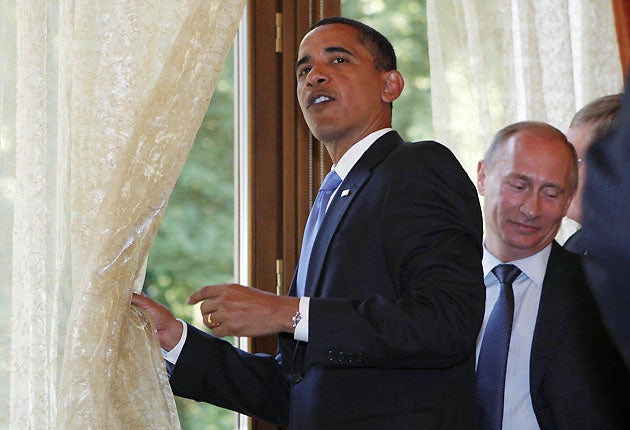Obama asks Russians to forge partnership with US

Your support helps us to tell the story
From reproductive rights to climate change to Big Tech, The Independent is on the ground when the story is developing. Whether it's investigating the financials of Elon Musk's pro-Trump PAC or producing our latest documentary, 'The A Word', which shines a light on the American women fighting for reproductive rights, we know how important it is to parse out the facts from the messaging.
At such a critical moment in US history, we need reporters on the ground. Your donation allows us to keep sending journalists to speak to both sides of the story.
The Independent is trusted by Americans across the entire political spectrum. And unlike many other quality news outlets, we choose not to lock Americans out of our reporting and analysis with paywalls. We believe quality journalism should be available to everyone, paid for by those who can afford it.
Your support makes all the difference.Working to turn Russia from antagonist to ally, President Barack Obama asked the Russian people today to "forge a lasting partnership" with the US, but he acknowledged after talks with Prime Minister Vladimir Putin that on divisive issues there won't be "a meeting of the minds anytime soon."
Obama was wrapping up a two-day stay in Russia, during which he and President Dmitry Medvedev said they were determined by year's end to negotiate a new nuclear arms treaty that would slash both country's arsenals by about one-third.
After breakfast at Putin's country home, Obama sped back to central Moscow to tell the graduating class of the prestigious New Economic School that the US and Russia were not "destined to be antagonists."
Throughout his young presidency, Obama has hewed to a singular message about US-Russian relations, insisting that both nations must get beyond the kind of thinking that gripped Moscow and Washington during the decades of the Cold War. He reprised that in his graduation speech.
"It is difficult to forge a lasting partnership between former adversaries," Obama said. "But I believe on the fundamental issues that will shape this century, Americans and Russians share common interests that form a basis for cooperation."
Before leaving for Russia, Obama had said that Putin had "one foot in the old ways of doing business and one foot in the new." After breakfast with the Russian leader, he told Fox News Channel: "I found him to be tough, smart, shrewd , very unsentimental, very pragmatic. And on areas where we disagree, like Georgia, I don't anticipate a meeting of the minds anytime soon."
Putin, the former Russian president, also spoke warmly of his country's hopes for improved US ties with Obama in the White House.
"With you we link all our hopes for the furtherance of relations between our two countries," the former KGB official said, sitting next to Obama.
The White House had been hoping to reach a broader Russian audience with Obama's speech, but the address was not widely available on television. It was carried live on the 24-hour news channel Vesti, but not on any of the main, more widely watched Russian outlets such as First Channel, Rossiya, or NTV.
Obama used his speech to further define his view of the United States' place in the world and, specifically, to argue that the US shares compelling interests with Russia.
"Let me be clear: America wants a strong, peaceful and prosperous Russia," he declared.
His upbeat comments showed Obama's determination to turn around public opinion in Russia, where polls show people are wary of the United States and take a skeptical view of Obama himself.
He said Russian and US interests largely overlap in halting the spread of nuclear weapons, confronting violent extremists, ensuring economic prosperity, advancing the rights of people and fostering cooperation without jeopardizing sovereignty.
But he also sprinkled in challenges to Russia, particularly in the area of democracy. US officials are wary of Russia's increasingly hard-line stand on dissent.
"By no means is America perfect," Obama said. But he also said: "Independent media have exposed corruption at all levels of business and government. Competitive elections allow us to change course. ... If our democracy did not advance those rights, I as a person of African ancestry wouldn't be able to address you as an American citizen, much less a president."
Obama said the US will not try to impose any kind of governing system on another country. But he argued for democratic values "because they are moral, and also because they work."
On Georgia and Ukraine — two nations that have sought Nato membership to the chagrin of neighboring Russia — Obama tried a diplomatic touch. He defended the steps nations must take to join the alliance, adding, "Nato seeks collaboration with Russia, not confrontation."
The White House described the session positively, on the whole.
Both sides agreed to try to be better listeners and pay more attention to how each side is looking at the same issues, said one senior administration official, speaking on condition of anonymity to discuss details of the private meeting that was described as "very candid."
Before the speech Obama held what the White House characterized as a "good meeting" with former Soviet President Mikhail Gorbachev. The US leader, accompanied by Medvedev, also met with US and Russian business leaders. Obama also met with a diverse collection of nongovernment leaders from both countries — health experts, environmentalists, reporters, human rights advocates — who held their own summit to re-engage engage bilateral cooperation.
Obama also met Russian opposition leaders.
On Wednesday he heads to a G-8 summit in Italy. While there he will meet Pope Benedict XVI, before moving on to Ghana where he plans to deliver what the White House describes as a major foreign policy speech.
Join our commenting forum
Join thought-provoking conversations, follow other Independent readers and see their replies
Comments